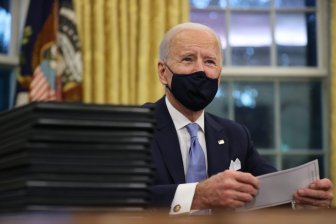When the House of Commons unanimously agreed to push the government to designate the Proud Boys a terrorist organization, many applauded the move.
But some national security experts watched the decision with trepidation. They believe the move could send Canada down a very dangerous path.
“This is the sort of thing we need to be careful about, because it’s a path that we shouldn’t go down very easily,” said Richard Fadden, the former head of the Canadian Security Intelligence Service (CSIS).
Fadden, and other national security experts interviewed by Global News, warn the move takes Canada one step closer towards politicizing the process of placing a group on the terror list — which could have serious impacts on the freedoms of Canadians.
NDP Leader Jagmeet Singh was behind Monday’s non-binding motion, which called on the government to “use all available tools to address the proliferation of white supremacists and hate groups starting with the immediately designating the Proud Boys as a terrorist entity.”
Far-right groups were among the hundreds of protesters who stormed Capitol Hill in the United States earlier this month, leaving five people dead in their quest to halt the certification of Joe Biden’s election win.
In calling on supporters to continue to support his push, NDP Leader Jagmeet Singh called the Proud Boys a “right-wing extremist group that promotes white supremacist views.”
“Members of the Proud Boys joined a group armed with deadly weapons as they led an assault on the U.S. Capitol — this was an act of domestic terrorism,” the webpage reads.
“Join Jagmeet in calling on Justin Trudeau’s government to immediately ban and designate the Proud Boys as a terrorist organization.”

While security experts say it’s a good thing that far-right groups are getting more attention for the risks they present, they also said Singh’s non-binding call — which all parties supported in the House of Commons — is a “slippery slope.”
Leah West, who is a practicing national security lawyer, pointed to early 2020 as an example, when Indigenous groups and environmental activists blockaded railways and ports as a part of their protest against a proposed pipeline project.
“There were politicians calling those protests a terrorist activity, and calling the environmental groups and the Indigenous groups involved and those who support them terrorists,” West explained.
She said that if the government allows its determination of who belongs on terrorist lists to be influenced by politically-motivated votes in the House of Commons, groups could be placed on these lists based on the ideological majority in Parliament.
“You can see the same kind of action being taken: calling on the government to take a very specific course of action with respect to what to do legally about a subset of the population that doesn’t align with their ideological stance. And I think that’s really risky,” West said.

Traditionally, terrorist group designations are only announced following a rigorous process. Intelligence agencies explore all available information to learn whether a specific group is engaging or aiding in terrorist activity.
“I think Canada has a reputation for being pretty careful in when it designates terrorist organizations. I think it’s a good thing,” Fadden said.
Before the public servants can even start that deep dive into the merits of placing these groups on a terror list, however, Fadden explained that there are definitions that have to be met.
First off, the group actually has to be considered an organization. That means there has to been some cohesion to it, as opposed to a smattering of unrelated individuals being scattered around the world. Fadden added that the agencies then have to consider whether a group has an organized chain of command, or if its chapters function independently.

If the group meets all these definitions and the intelligence agencies find there are reasonable grounds to believe a group is either directly engaged in or aiding terrorist activity, they can present their report to cabinet — which then decides whether to rubber stamp the recommendation to add a group to the terror list.
“It is taken very seriously by the security organizations,” said Stephanie Carvin, a Carleton University professor and former CSIS analyst.
“They do have teams that comb through publicly available information that create dossiers that then are used to basically brief (the) minister of public safety on listings.”
Fadden added that most Parliamentarians don’t have access to the level of information that CSIS employees and other intelligence agencies do as they put together their reports.
“The information that is supposedly best used to determine whether or not an organization is terrorist is not necessarily all publicly available and Parliament, broadly speaking, doesn’t have access to classified information,” he said.

He added that in voting to push the government to add the Proud Boys to this list, politicians could be trying to tip the scales of this rigorous, non-partisan process.
“While it’s probably not their intention to pressure the public servants who are looking at this, implicitly, that’s going to happen,” Fadden said.
And that pressure could have serious consequences.
Once a group is added to the terror list, there are immediate and serious repercussions. Banks immediately de-risk those groups — meaning members of these organizations will see their bank account closed and won’t be able to use these financial institutions again, among other consequences.
“Designation as a terrorist organization limits people’s rights. You know, they lose the right to own property, to try to move financial things,” said Fadden.
“It has a significant impact. So if it is a terrorist organization, it should certainly be designated, but it should not be designated if it’s not truly one objectively determined on the basis of the various rules that have been set out.”

West added that these groups get no warning that they’re going to be added to a list, which leaves little space for fighting a terrorist designation.
“There’s no chance for a group to respond to a potential listing before they’re listed. There’s no notification that a group will be listed. And then once you’re listed, realistically, your assets are frozen, it becomes unlawful to provide you assistance,” West said.
“For the one case that we did have where someone tried to challenge that (listing), they had no money and the lawyer couldn’t bring a case because, arguably even providing the legal services was a violation of the law.”
While the NDP is not backing down on its call to demand the Proud Boys be added to this terror list, a spokesperson for the party said it isn’t their intention to politicize the process.
“The NDP has always fought to reform the process of the terrorist list designation that has been used in the past to target communities and organization that were not a threat and there is no doubt that we should not politicize the process of terrorist list designation,” said NDP spokesperson Melanie Richer in a statement.
“But as it stands, the Minister has to approve the recommendation of putting a group on the list and it is important that politicians and Canadians ask for immediate actions from the government to dismantle the Proud Boys and other dangerous white supremacist groups before something terrible happens.”

Public Safety Minister Bill Blair, who holds the pen that signs off on these terrorist group designations, also emphasized the importance of this independent process — even after the Liberals voted in favour of the motion.
“To be clear: the decision to list any organization as a terrorist entity is based on intelligence and evidence collected by our national security agencies. Terrorist designations are not a political exercise,” read a statement sent by Blair’s spokesperson, Mary-Liz Power.
“Such listings send a strong message that Canada will not tolerate acts of violence. Concretely, listings can help support possible criminal investigations and the prosecutions of those offences.”
The statement also quoted Blair stating that the Proud Boys are “white supremacists, anti-Semitics, Islamophobic, misogynist groups; they’re all hateful, they’re all dangerous.”
The Conservative Party, which also voted in favour of the non-binding motion, did not respond to a request for comment.

Meanwhile, despite their concerns about the motion, the experts who spoke to Global News acknowledged that politicians don’t have to avoid conversations about the terror list entirely. While they said Parliament shouldn’t be telling the public service who it should recommend be added to the terror list, there is room for politicians to ask questions about how those recommendations are made — and how they can be improved.
“For the most part, the groups on that list represent one type of terrorist threat, and that’s largely the terrorist threat stemming from Islamist-inspired extremism — when we know for sure that is not the only terrorist threat facing states in the world,” West said.
Read more:
What it means when an extremist group is added to Canada’s list of terrorist organizations
Carvin echoed West’s remarks, saying issues of bias within these intelligence agencies always warrant discussing.
“(Politicians) should be asking, it took a long time for this, or are you paying enough attention to this? And we have started to see questions being asked of the CSIS director,” Carvin said.
“These are the kinds of things that I would like to see Parliament asking. I don’t think that’s unreasonable to ask at all.”
However, she warned that politicians should never step on the scales when it comes to determining who belongs on a terror list.
“I welcome (Singh’s) motion to critique the violence, but there is a political process that needs to play out independently of parliamentary votes,” Carvin said.
“We may be happy condemning certain groups today, but there may be groups in the future where it’s less clear cut or it’s subject to political whims rather than the facts.”
© 2021 Global News, a division of Corus Entertainment Inc.







